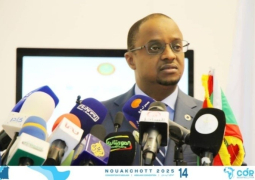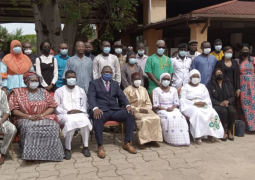
Madam Mashologu made the remarks yesterday, Thursday, during the validation of the Office of the National Security Communication Strategy. The validation, held at Bakadaji Hotel, was supported by the United Nations Development Programme.
The development of the Communication Strategy came out of the recommendations of the Security Sector Reform Assessment Report of 2017. The assessment report made some key recommendations for the Security Sector Reform (SSR) in The Gambia. Among them was the formulation of policies and strategies, documents to help chart a pathway for the implementation of the most needed reform in the country.
The Communication Strategy will ensure that the gains and the efforts of the ongoing SSR and the wider Office of the National Security activities are communicated to the public, hold regular media briefings, press conferences, regional tours, town hall meetings, among others. The strategy will further amplify the national security coordination model of the National Security Architecture.
The UNDP resident representative thus described the validation of the Communication Strategy as a significant milestone in their collective journey towards a secure, transparent and resilient nation.
She observed that the role of the strategy is to ensure they restore public trust and confidence in the security sector as the country continues its journey in transitional justice and implementation of the recovery focus of the National Development Plan.
She noted that the partnership between stakeholders who contributed to the document exemplifies how international cooperation could support national efforts in addressing complex security challenges, adding that it is through such collaborations that they could continue to build the foundation for lasting and sustainable peace.
She also said that, in an increasingly connected world, social media and everything else, it is essential that timely, accurate and proper information is communicated to the citizenry and the various rights organisations to make informed decisions for the safety and security of its people.
She stressed the need to ensure that the Communication Strategy is not a Banjul Strategy, but rather a strategy that consults, engages and communicates with respectively regions and is embedded in the local government structures, institutions and civil society organisations.
She also emphasised the need to ensure messaging that is sensitive, can speak and translate to the youth, young people, children, Persons With Disabilities, community and religious leaders in the country is made available to all.
“This is not just a document but a road map and a living document that will continue to be updated as more stakeholders are better empowered in terms of information and knowing all the information that can ensure a peaceful and prosperous Gambia,” she stated.
Colonel Omar B. Bojang, deputy National Security Adviser at the Office of National Security, said the validation was an important milestone in the ongoing security sector reforms process, which started following the change of government in 2017.
Colonel Bojang described effective communication as vital in promoting advocacy, innovation and feedback on key security issues.
According to him, the many efforts made into the SSR processes are beginning to pay dividend, noting that the security forces now adhere to the democratic practice that upholds the principles of good governance in line with international conventions, treaties and best practices.
He pointed out that there is currently no arbitrary arrest, no detention without trial, and no disappearance without trace.
“The National Intelligence Agency, now rebranded the State Intelligence Agency, for the past 7 years has not engaged in any arbitrary arrest, detention, torture and/or any other forms of right abuses,” declared, saying: “The Gambia Police Force now hardly detains suspects beyond the mandatory 72 hours as required by law and embraces the concept of community policing and respect for human rights and the rule of law.
“The Gambia Armed Forces is now focused on its core mandate of safeguarding the territorial integrity of The Gambia. Furthermore, the security forces have accepted the oversight role and are more accountable than before.”
Read Other Articles In Headlines





